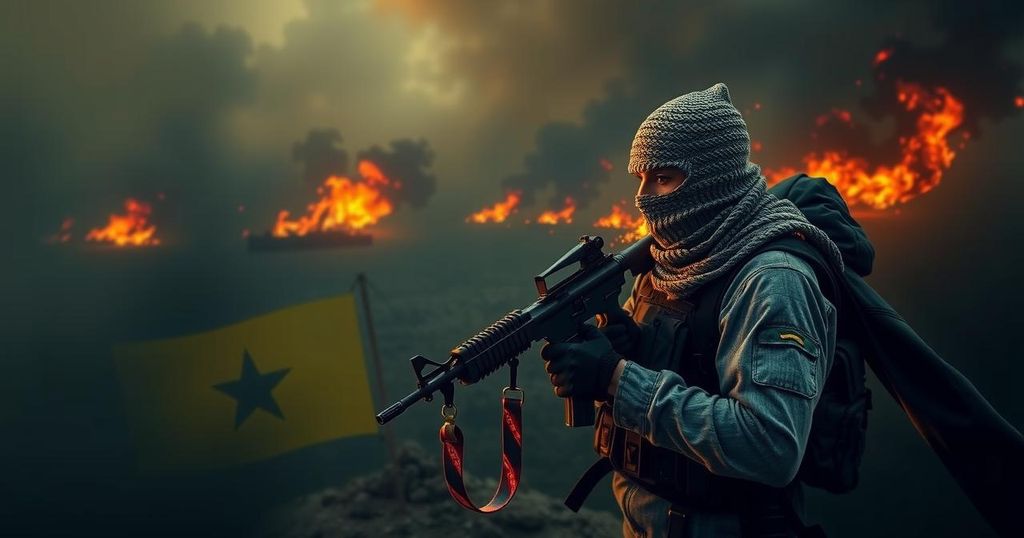Global news
AL - QUSAYR, ALI AL - AMIN, AND, ASHARQ AL - AWSAT, ASIA, BASHA, BASHAR AL - ASSAD, CONFLICT, HASSAN NASRALLAH, HEZBOLLAH, ISRAEL, LEBANON, MIDDLE EAST, MIDDLE EAST AFFAIRS, MILITARY OPERATIONS, NORTH AMERICA, RIAD KAHWAJI, SYRIA, SYRIAN OBSERVATORY FOR HUMAN RIGHTS, UNITED STATES
Fatima Khan
0 Comments
Hezbollah’s Role in the Syrian Conflict: Strategic Withdrawal Amidst Domestic Struggles
Hezbollah is reportedly not participating in the ongoing conflict in northern Syria, having withdrawn its forces to address challenges in Lebanon following significant losses sustained during its recent war with Israel. Experts suggest the group’s military role in Syria has diminished, focusing instead on monitoring the situation while dealing with unprecedented casualty figures and internal issues.
Hezbollah appears to be refraining from involvement in the escalating conflict in northern Syria, particularly following a significant offensive launched by the rebel group Hayat Tahrir al-Sham on November 27. This decision is compounded by the recent conflict with Israel, which has severely impacted Hezbollah’s military capabilities and leadership. Various Lebanese sources indicate that Hezbollah has withdrawn a substantial number of its fighters from Syria to focus on addressing its challenges in Lebanon. Reports suggest Hezbollah’s operational capacity in Syria is currently limited to its strongholds in Al-Qusayr and Bloudan, where the number of remaining fighters is uncertain and their military engagement appears restrained.
Experts, including Rami Abdel Rahman of the Syrian Observatory for Human Rights and Riad Kahwaji from INEGMA, underscore that Hezbollah fighters are not participating in the active fighting in northern Syria. Kahwaji highlights the difficulties Hezbollah would face regarding a military re-engagement in Syria, largely due to its ceasefire agreement with Israel. Complementing this perspective, political analyst Ali Al-Amin noted that Hezbollah’s presence in northern Syria has diminished as resources are directed toward its operations in Lebanon, cautioning that further involvement in Syria could tarnish its reputation even among its supporters.
The Lebanese daily L’Orient-Le Jour further contends that Hezbollah will be compelled to monitor the situation from a distance, as it shifts its focus toward domestic issues. This change comes amid a strategic separation of the Assad regime from the Iranian-led Axis of Resistance, as regional dynamics shift following the latest Gaza conflict.
As Hezbollah copes with losses from its recent war with Israel, preliminary estimates indicate that the group has sustained unprecedented casualties, potentially losing between 3,500 to 4,000 members alongside significant infrastructural damage. The extensive toll includes not only fighters but also critical support personnel, with many still unaccounted for. The Lebanese health minister has reported rising civilian casualties, further emphasizing the humanitarian crisis stemming from the conflict and underscoring the complex choices facing Hezbollah as it navigates ongoing regional tensions.
The situation surrounding Hezbollah’s involvement in Syria is marked by the recent offensive actions by rebel groups such as Hayat Tahrir al-Sham and the consequential events stemming from Hezbollah’s significant conflict with Israel. Since the outbreak of the Syrian civil war in 2011, Hezbollah has played a crucial role in supporting the Assad regime, yet its capacity to engage in further military actions is seriously undermined following the recent hostilities with Israel. The current geopolitical environment, characterized by strained relations between the Assad regime and Iranian forces, further complicates Hezbollah’s strategic decisions regarding its troop deployments and future engagements in Syria.
In conclusion, Hezbollah’s reported withdrawal from active military engagement in Syria reflects both the impacts of its recent conflict with Israel and a strategic reassessment of its resources. With severe troop losses and internal pressures, Hezbollah’s capabilities in Syria appear significantly diminished, leading the group to focus on addressing immediate challenges at home while monitoring developments across the border. As conflicts continue to evolve, Hezbollah’s positioning remains crucially tied to its domestic standing and regional alliances.
Original Source: www.newarab.com




Post Comment